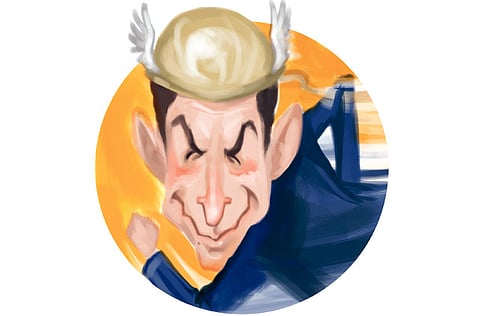Mercurial Sarkozy plots his comeback
Despite his ratings falling to crushing lows, the French president is a fighter and has risen from the ashes in the past

Fifteen years ago he was cast aside by the Gaullist right because he backed a rival candidate to Jacques Chirac for the French presidency. Four years later he was in disgrace with his own camp for securing a mere 13 per cent of the vote as leader of the party list in elections to the European Parliament.
But Nicolas Sarkozy is nothing if not a fighter. He punched his way back into the government in 2002 and secured the presidency in 2007. Now, despite crushingly low poll ratings, he is once again trying to plot his comeback.
The starting point could hardly be more testing. This month Sarkozy's popularity rating fell to 26 per cent, according to TNS Sofres, a pollster, a nadir it has touched only once before, in July.
At least 1 million people have taken to the streets during one-day strikes this autumn against the government's raising of the minimum retirement age. An open-ended strike has been called for today. Abroad, Sarkozy's image has been dented by the highly publicised evacuation of illegal Romani camps in France — although most French voters seem to approve. At home, a breezy opposition Socialist Party has started to believe that the next presidential election, in 2012, is there for the taking.
Sarkozy seems to be devising a two-pronged fightback. First, he hopes to use France's presidency of the G20, which starts in mid-November and is followed by the G8 presidency in 2011, as a means to reassert his voice abroad and to boost his standing at home. When France held the rotating European Union presidency in the second half of 2008, Sarkozy's popularity rating climbed from 38 per cent to 46 per cent, according to OpinionWay, another pollster.
Never short on ambition, Sarkozy wants the G20 to become the forum for talks about global economic stability and governance, including exchange-rate volatility.
Currency discussions
There are plans for the two G20 summits in France next year to be preceded by thematic seminars steered by various world leaders, the better to squeeze meaningful decisions out of the summit meetings themselves. To this end the French have been quietly talking to the Chinese, trying to get the idea of exchange-rate co-ordination on the table.
A foretaste of Sarkozy's new diplomacy will be on display on October 18-19, when he meets Germany's chancellor, Angela Merkel, and Russia's president, Dmitry Medvedev, in the Normandy resort of Deauville. He will revive an idea he first raised in 2008, in response to Russian proposals, for a new "economic and security space" between Russia and the EU.
Many EU countries considered this to be a Russian ploy to weaken Nato, and American officials are watching nervously. Sarkozy argues that Russia needs to be treated as a partner rather than a threat, especially if the West wants its help over such matters as Iran's nuclear programme.
Sarkozy's second front is a plan to refresh his government and give domestic policy a boost. Before the summer he said he would reshuffle his government by late October, after parliament had passed pension reform (the legislation is currently before the upper house). Since then Paris has been awash with rumours.
Certain ministers seem likely to go. But the biggest question-mark hangs over François Fillon, the prime minister. He is the second longest-lasting occupant of the job. Fillion, whose calm, professorial style contrasts with Sarkozy's hyperactivity, is unusually popular. And there is no obvious replacement.
Is a new government likely to do anything useful in the 18 months left before the 2012 presidential election? Aides to Sarkozy had been arguing that there was no time for any more reforms after the retirement-age increase. But now the tune seems to be changing. Senior officials insist that the president will "continue to reform the country until his last minute in office".
One idea is to rethink the tax system. This week Fillon raised the prospect of the abolition of France's wealth tax, imposed yearly on almost all assets worth over 790,000 euros (Dh4 million), and the tax shield that limits all personal taxation to 50 per cent of income.
Yet such plans await Sarkozy's reshuffle decision. There is no guarantee that a new government, or a fresh round of globetrotting, will be enough to lift his miserable poll numbers.
Unease over the style and clannishness of his mercurial presidency will remain. A diplomatic flurry may exasperate foreign friends, and lead to little.
The experience of Sarkozy's two immediate predecessors, both of whom were re-elected, offers little comfort. At this stage in his first term, François Mitterrand was unpopular, but less so than Sarkozy — whereas Chirac had already regained the poll numbers he enjoyed in the months after his election.


